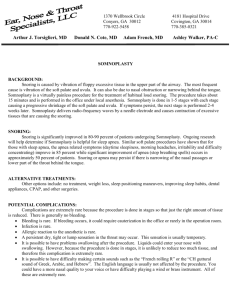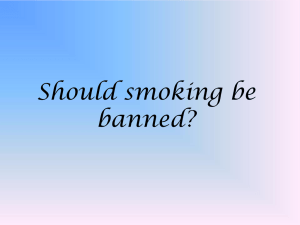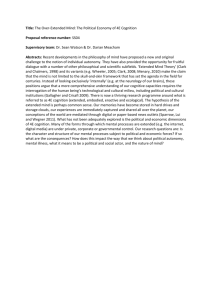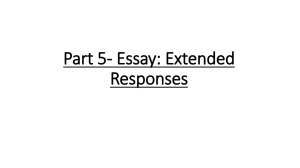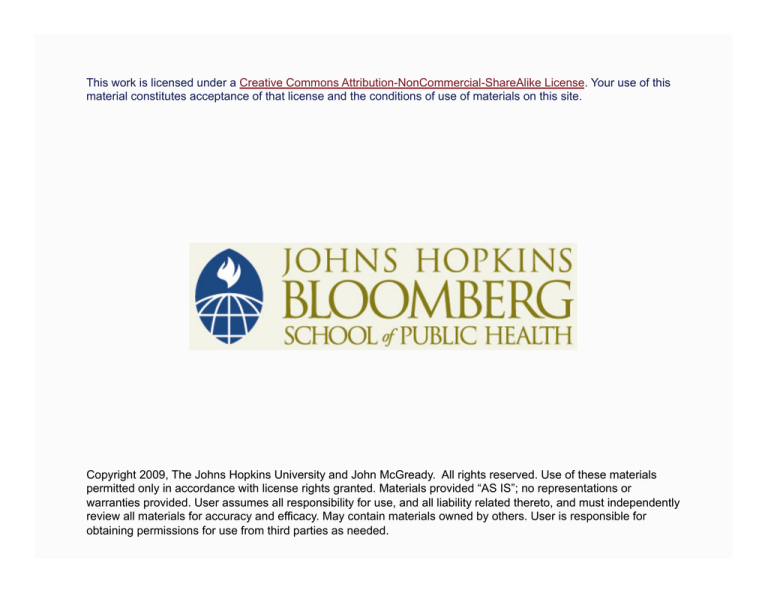
This work is licensed under a Creative Commons Attribution-NonCommercial-ShareAlike License. Your use of this
material constitutes acceptance of that license and the conditions of use of materials on this site.
Copyright 2009, The Johns Hopkins University and John McGready. All rights reserved. Use of these materials
permitted only in accordance with license rights granted. Materials provided “AS IS”; no representations or
warranties provided. User assumes all responsibility for use, and all liability related thereto, and must independently
review all materials for accuracy and efficacy. May contain materials owned by others. User is responsible for
obtaining permissions for use from third parties as needed.
More Multiple Linear Regression
John McGready
Johns Hopkins University
Lecture Topics
Examples of linear regression from the public health/
medical literature
Multiple linear regression—where is the line?
Collinearity
Assumptions of MLR
Correlation in MLR
3
Section A
Examples from the Literature
Smoking and Cognition
Cigarette Smoking and Cognitive Decline in Midlife:
Evidence From a Perspective Birth Cohort Study
(Richards, M., Jarvis, M., et al. American Journal of Public
Health. Vol 93. No. 96. 2003)
Continued
5
Smoking and Cognition
Abstract
Continued
6
Smoking and Cognition
Outcome
Continued
7
Smoking and Cognition
Potential confounders
Continued
8
Smoking and Cognition
Results from MLR
Continued
9
Smoking and Cognition
Results from MLR
Continued
10
Smoking and Cognition
Regression model detailed in 2nd column
Change in memory score = intercept*+ smoking
(three categories) + sex (binary) + education level
(four categories) + social class (five categories)
* Intercept not shown in table
Continued
11
Smoking and Cognition
Information in footnotes
Continued
12
Smoking and Cognition
Results from MLR
Continued
13
Smoking and Cognition
Results from MLR
Continued
14
Smoking and Cognition
Smoking more than 20 cigarettes at age 43 was
associated with a greater decline in memory scores
between 43 and 53 years (by 1.10 units on average, 95%
CI .30 to 1.89 units) relative to subjects who did not
smoke at age 43
No statistical differences in change in memory scores
between ages 43 and 53 were found between smokers
who smoked 1-20 cigarettes per day at age 43, and
subjects who did not smoke at age 43
15
Blood Pressure and Snoring
Blood Pressure, Snoring, Obesity, and Nocturnal
Hypoxaemia (Hoffstein, V. Lancet. No. 244. 1994)
Continued
16
Blood Pressure and Snoring
Author’s summary
Continued
17
Blood Pressure and Snoring
Regression results
Continued
18
Blood Pressure and Snoring
Regression results
Continued
19
Blood Pressure and Snoring
SI = “snoring index” defined by authors as “number of
snores per hour”
Unadjusted analysis
A one-unit increase in the snoring index is
associated with a .004 mmHg increase in blood
pressure (95% CI .002 mmHg - .006 mmHg)
Doesn’t seem like “much” but snoring index of
subjects in this article ranges from less than
100 – greater than 400
Continued
20
Blood Pressure and Snoring
SI = “snoring index” defined by authors as “number of
snores per hour”
Adjusted analysis
A one-unit increase in the snoring index is
associated with no increase in blood pressure
(95% CI -.002 mmHg - +.002 mmHg)
After adjustment, relationship between BP and
snoring “disappears”: confounding?
Continued
21
Blood Pressure and Snoring
Regression results
Continued
22
Blood Pressure and Snoring
Footnote
23


